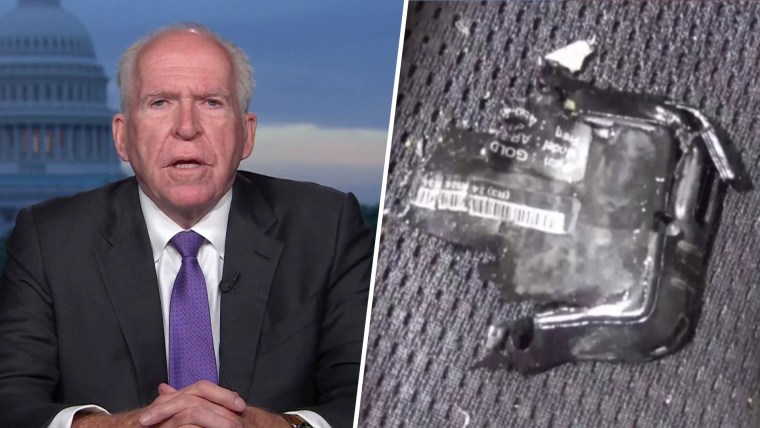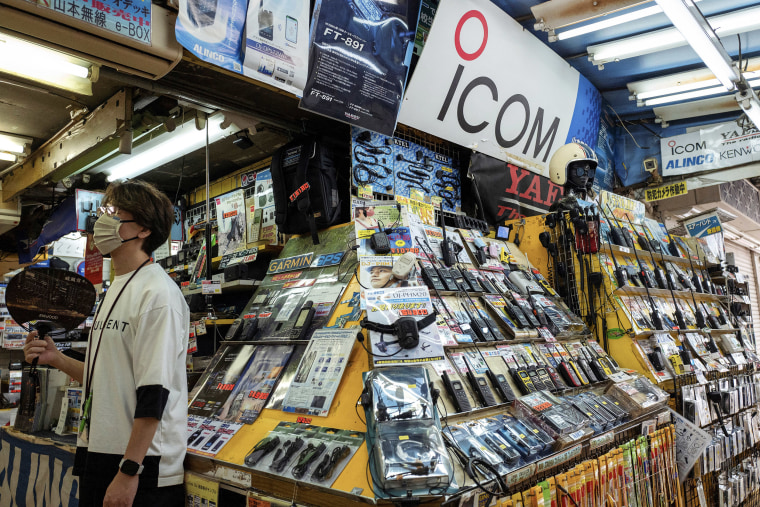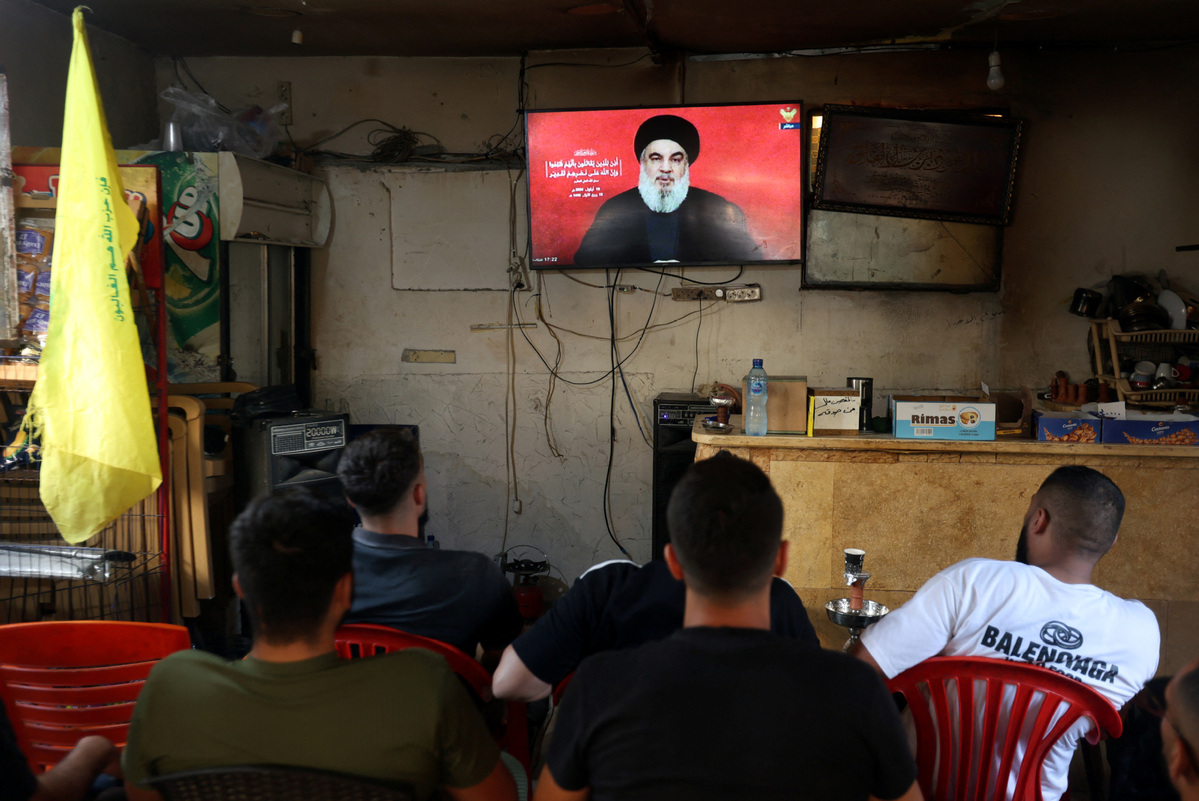The attack on southern Lebanon involved airstrikes and artillery but Israeli ground forces had not crossed the border, an Israeli official told NBC News..
The Israel Defense Forces announced the strikes — which it said were aimed at degrading the group’s “capabilities and infrastructure” — just as the leader of the Iran-backed militant and political group began a much-anticipated response to the stunning attacks using walkie-talkies and pagers.
- Two soldiers were killed in combat in northern Israel, the IDF said. Lebanon's Ministry of Public Health reported that four people were injured in raids on a town in southern Lebanon, according to the state-run National News Agency.
- At least 37 people, including two children, were killed and thousands more injured across Lebanon, the country’s health minister said early Thursday — a rising toll from the wave of attacks that left the country reeling and the region on the brink.
As the world urged against further escalation after months of devastating war with Hamas in the Gaza Strip, Israel indicated its focus had shifted to its northern border with Lebanon, declaring a “new phase” to its simmering months-long conflict with Hezbollah.
He warned that Hezbollah will pay an "increasing price" as time goes on.
- "Hezbollah feels that it is being persecuted, and the sequence of military actions will continue," Gallant said. "Our goal is to ensure the safe return of Israel's northern communities to their homes."
In Lebanon, the attacks left Hezbollah in disarray and an already beleaguered country rattled, with hospitals overwhelmed and the public fearful that mobile phones or other devices may explode.
In a speech Thursday, Hezbollah leader Hassan Nasrallah said, “there is no doubt that we have been exposed to a major and severe security and humanitarian blow,” referring to the device explosions as an unprecedented “terrorist” attack, and noting that the explosions of roughly 4,000 devices wounded civilians, not just Hezbollah members.
He went on to call it an act of war against Lebanon, but did not specify how or when Hezbollah would retaliate.
“The enemy has crossed all red lines and all laws in this attack,” Nasrallah said, vowing that Israelis would not be able to achieve their goal of repopulating Israel’s evacuated northern areas without ending its military “aggression,” and reiterated that Hezbollah "will not stop before the aggression on Gaza stops."
- As Nasrallah delivered his speech, Israeli warplanes flew over Beirut, breaking the sound barrier with sonic booms shaking the capital, in what appeared to be a show of might.

John Brennan warns of escalation after Hezbollah devices explode
03:26
The Lebanese Army said Thursday that specialized units were detonating “pagers and suspicious communication devices in various areas,” warning the public to stay away from the blast sites and report any suspicious devices without approaching them.
- A former senior Israeli security official told NBC that the devices were not detonated as part of a strategic decision, but because the military was trying to act while it was still possible to use the explosives.
“The timing was not a strategic decision, but of necessity, because it became a kind of use it or lose it situation,” the former official said.
The Israeli military said it was "operating to bring security to northern Israel in order to enable the return of residents to their homes, as well as to achieve of all of the war goals."
In northern Israel earlier Thursday, at least eight people were injured by anti-tank fire from across the Lebanon border, health authorities said.
Gallant, in a separate post on X, said he spoke with Defense Secretary Lloyd Austin overnight, briefing him on “IDF operations in the southern and northern arenas, focusing on Israel’s defense against Hezbollah threats.”
While Israel has not taken direct responsibility for the attacks, the militant group and Lebanese officials also pinned the blame on Israel.
The country's foreign minister, Abdallah Rashid Bouhabib, is set to participate in an emergency session of the United Nations Security Council in New York on Friday.
Exploding devices leave a trail from Taiwan to Bulgaria
The agency also prohibited their transportation via freight cargo.
The Lebanese Telecommunications Ministry identified the exploding devices Wednesday as Icom V82s, a type of handheld walkie-talkie.
Osaka-based Icom said Thursday that it had not shipped that model for 10 years after it ceased production of the unit.

"The process is highly automated and fast-paced, so there’s no time for such things," he told Reuters.
Enomoto added that the company cannot confirm if the devices shipped by Icom to the Middle East a decade ago were involved in the explosions because it didn't put any hologram stickers on them, a common way of verifying the authenticity of products.
Icom’s website lists the V82 as one of its most counterfeited products.
“No parts other than those specified by our company are used in a product,” Icom said in a statement. The firm declined NBC News’ request for further comment.
As authorities across the world scrambled to track how the devices that exploded made their way into the hands of Hezbollah, Bulgaria’s state news agency said Thursday that the country was investigating the possible involvement of a company registered there, without directly naming it.
Images of the pagers bore the name of a Taiwanese electronics manufacturer, Gold Apollo, which said the devices were made by a Hungarian firm, BAC Consulting, that it said was authorized to use Gold Apollo's logo for product sales in certain regions, “but the design and manufacturing of the products are entirely handled by BAC."
Whether original Gold Apollo products were tampered with, or entirely fake ones manufactured, was still being investigated, a spokesperson for the Taiwanese Economic Affairs Ministry told NBC News.
Hungarian officials said that BAC Consulting was just a trading intermediary and that none of the pagers had been inside the country.
The company's chief executive, Cristiana Bársony-Arcidiacono, confirmed to NBC News on Wednesday that her company worked with Gold Apollo. But when asked about the pagers, she said over the phone, “I don’t make the pagers. I am just the intermediate. I think you got it wrong."
Bársony-Arcidiacono has since not responded to requests for further comment.
Raf Sanchez reported from Tel Aviv, Mithil Aggarwal reported from Hong Kong, Yuliya Talmazan from London and Doha Madani from New York.
Bulgaria investigates firm linked to Hezbollah's explosive pager sales
Bulgaria's state security agency, DANS, is launching an investigation into a company associated with the sale of pagers to Hezbollah that detonated in a coordinated attack.
DANS is working with the Interior Ministry to examine the involvement of the unnamed company registered in Bulgaria.
According to the agency's statement, no shipments of the suspect pagers have been detected on Bulgarian territory.
Earlier, Japanese company Icom pointed out that it discontinued production of the radio model reportedly involved in the recent explosions in Lebanon around a decade ago.
"The IC-V82 is a handheld radio that was produced and exported, including to the Middle East, from 2004 to October 2014. It was discontinued about 10 years ago, and since then, it has not been shipped from our company," Icom stated.
The firm also clarified that the production of batteries required for the device had been discontinued and that the absence of a holographic seal, which is used to authenticate genuine products, made it impossible to confirm whether the device had been shipped by Icom.
Additionally, Icom emphasized that products destined for overseas markets are sold exclusively through authorized distributors, claiming that its export program adheres to Japanese security trade control regulations.
"All of our radios are manufactured at our production subsidiary, Wakayama Icom Inc., in Wakayama Prefecture, under a strict management system... so no parts other than those specified by our company are used in a product. In addition, all of our radios are manufactured at the same factory, and we do not manufacture them overseas," the statement read.
'Israel' planted explosives in pagers sold to Hezbollah: NYT
Pagers ordered by Hezbollah from Gold Apollo were tampered with before arriving in the county, some officials stated. Most pagers were the AR924 models, but the shipment also included three other models from the company, according to NYT.
Taiwanese manufacturer Gold Apollo said the pagers were produced and developed by a European company, CEO Hsu Chin-Kuang said on Wednesday.
"The pagers were both developed and produced abroad, so they have nothing to do with Taiwan," the Director was quoted as saying by Taiwanese news portal CTWANT.
He also said that about three years ago, Gold Apollo signed a cooperation agreement with a European company, which was only involved in distributing Gold Apollo products at first, but later began independently developing the pagers involved in the blasts.
The explosive material, weighing less than 60 grams, was implanted next to the battery in each device, two officials said. An embedded switch was also planted in the pagers, allowing for remote detonation of the explosives.
Three officials said that the devices were programmed to beep for several before exploding.
Independent cybersecurity experts confirmed that the strength and speed of the explosions were caused by a form of explosive material, based on footage of the attack.
“These pagers were likely modified in some way to cause these types of explosions — the size and strength of the explosion indicate it was not just the battery,” said Mikko Hypponen, a research specialist at software company WithSecure and Europol cybercrime advisor.
Read more: Snowden calls Israeli pager attack 'Indistinguishable from terrorism'
Read more: Pagers explosion will not return settlers to North: Israeli media
"The pager bombs were clearly intended to target individual civilians – diplomats and politicians – who were not directly participating in hostilities," The Guardian said, explaining that in legal terms, this would be called by lawyers as "excessive incidental civilian harm."
The piece also warned against normalizing the "unprecedented" Israeli attacks, because "if that is the case, the door is opened for other states to lethally test the laws of war."
Read more: New form of confrontation to prevail, says Hezbollah top official
There is concern that Israeli attacks could lead to a full-scale war, drawing the US into it in the region.
The piece, also mockingly, said "perhaps" after the presidential elections, the US would be able to tell Israeli Prime Minister Benjamin Netanyahu that "saving [his] skin should not be paid in the streets of Lebanon or by Palestinians in the occupied territories."
It also suggested that the US may only reconsider its stance after its presidential election, recognizing that protecting Prime Minister Netanyahu should not come at the expense of Lebanese civilians or Palestinians in the occupied territories.
"Until then, the rules-based international order will continue to be undermined by the very countries that created the system," The Guardian's editorial concluded.
Read more: US fears escalation following terror attack on Lebanon: The Guardian


 7 Min Read
7 Min Read




No comments:
Post a Comment